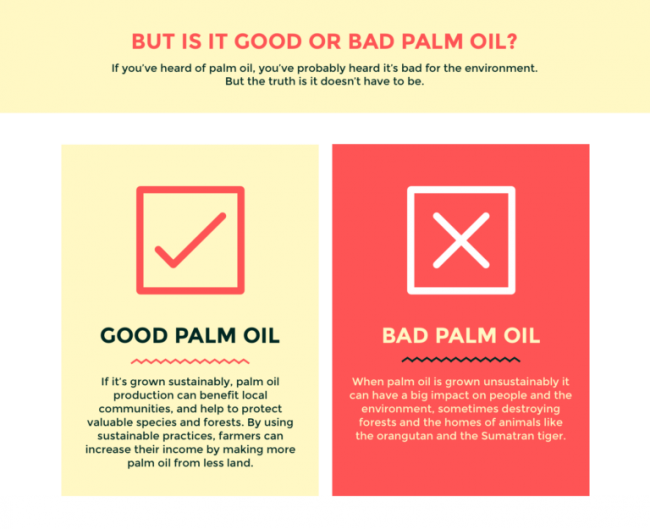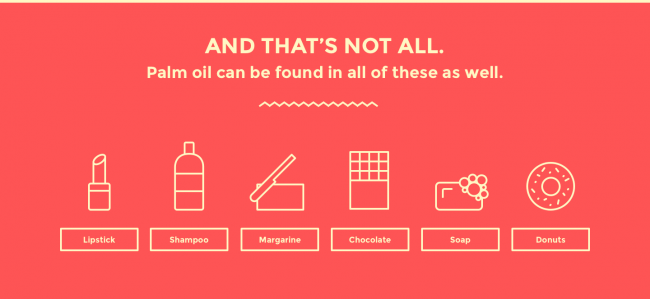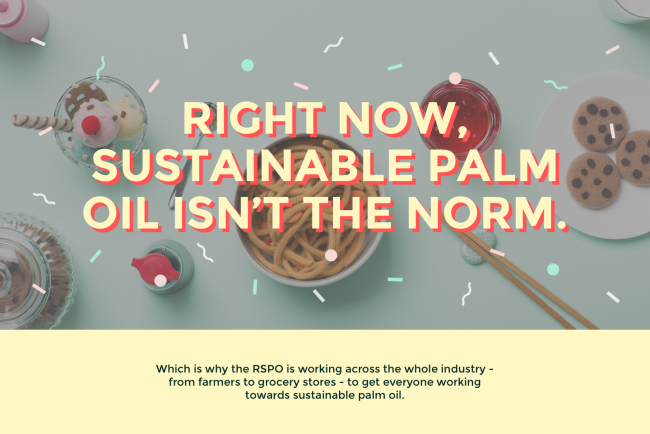*This blog post is sponsored by the Roundtable on Sustainable Palm Oil. Although this post is sponsored, all opinions are my own.

As a careful consumer, I try to buy foods that are easy on the earth- fruits and vegetables that are grown without pesticides, products that are fair trade and sustainably sourced. It matters to me that the money I spend feeding my family goes to support people and practices that use our planet’s resources wisely. Sometimes the choices are relatively easy- fair trade coffee, local organic produce, or products that give a portion of their proceeds to charity. We have numerous farmers markets near my house and several fair trade only stores are popping up in my city. But there’s one food item that is in more than half the food we buy, and it is grown in conditions that are destroying the habitats of the Sumatran tiger and the orangutan, evicts native forest-dwelling people’s from their traditional lands, and that devastates the environments where it is grown: Palm Oil.
Palm Oil is an important food crop- more than four and a half million people earn their living through Palm Oil production. World demand is growing rapidly, expected to double in the next few decades. It’s already the most produced and traded vegetable oil worldwide, and has been for years. And it’s easy to understand why: Palm Oil is an incredibly efficient and high-yielding vegetable oil, much more so than rapeseed or sunflower oils, for example. And Palm Oil is incredibly versatile- it’s in everything from margarines, shampoos, cosmetics, cookies, to candles, detergents, and more. Your local supermarket is filled with products containing *unsustainably* grown Palm Oil. But it doesn’t have to be this way.
Artist Jessica Dance has created these great short films to highlight the need for sustainability in the palm oil industry.
As demand grows, it’s vital that we find ways to meet the need for Palm Oil in a sustainable way. That’s where the Roundtable on Sustainable Palm Oil comes in. The RSPO has been working hard to eliminate unsustainable Palm Oil farming practices and move the industry towards one of sustainability and responsible environmental stewardship. A not-for-profit-company, the RSPO has developed a set of both environmental and social standards that companies must comply with in order to certify their Palm Oil as being Certified Sustainable Palm Oil (CSPO). These standards work to minimize the negative impact that Palm Oil farming has had on the environment and community in Palm Oil producing regions.
It’s so important that we as consumers strive to buy products we know to be easy on the earth and on the people who live on it. By buying products that use ethically sourced Palm Oil, we are able to support the efforts of the RSPO and help make Palm Oil an ethical and environmentally healthy choice.
For more information and to participate in the debate visit http://www.theguardian.com/sustainable-business/series/palm-oil-debate and http://www.rspo.org/consumers/debate. You can also follow RSPO on Facebook and Twitter. You can also follow the hashtag #GoodBadPalmOil
Find out more HERE and say YES To Good Palm Oil!










This is helpful information. I don’t care for palm oil in my foods, I didn’t realize it is in so many beauty products, too. I will be looking to ensure it is sustainably grown palm oil.